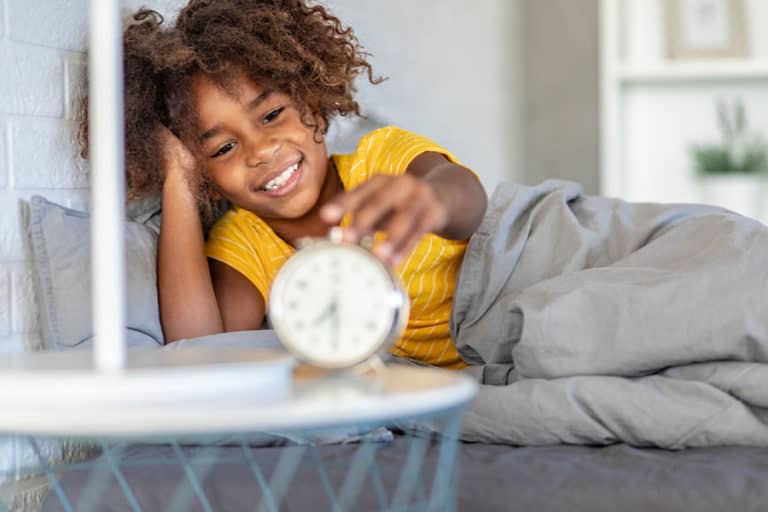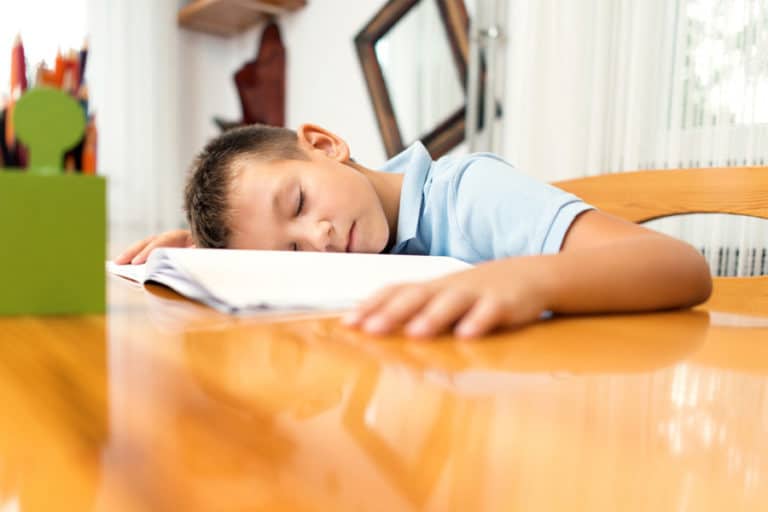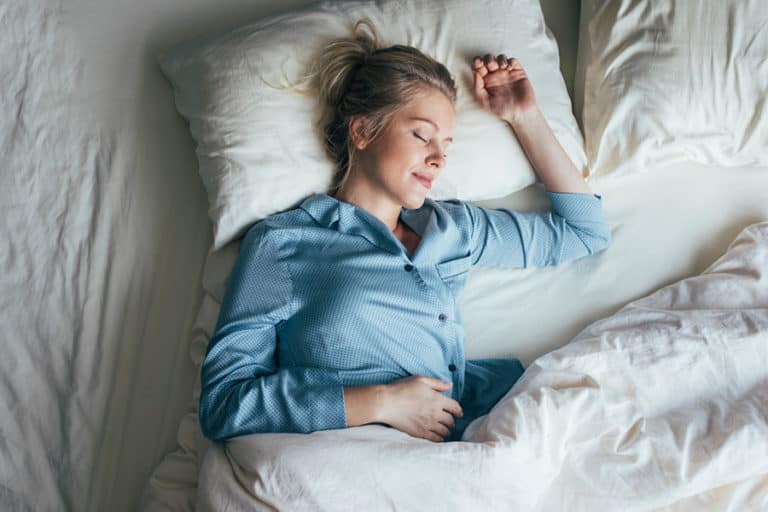Importance Of Sleep Duration: Is 6 Hours of Sleep Enough?

Is 6 Hours Of Sleep Enough? | Signs Of Sleep Deprivation | Quality Vs Quantity | Factors | Tips
Sleep is a vital part of our daily lives, playing an important role in the maintenance of our physical and mental health. It’s the time when the entire body, including the brain, repairs and recharges itself.
Important as it is, good quality sleep is hard to come by in our stressed-out times. Worse still, nobody seems to have conclusive answers about how many hours of sleep we need.
Is 6 hours of sleep enough? The answer to this question is not straightforward. After all, sleep is a complex process that involves several stages and cycles. Let’s unpack this question below.
Is 6 hours of sleep enough?
Some people may feel rested and refreshed after 6 hours of sleep. However, 6 hours of sleep is not the recommended number of sleep hours per night.
According to the National Sleep Foundation [1]Sleep Foundation: How Much Sleep Do We Really Need?, adults should get between 7 and 9 hours of sleep each night for optimal health. Most individuals require more than that for optimal functioning.
The recommended amount of sleep per night varies depending on age and several other factors. Let’s examine the 3 important factors determining whether 6 hours of sleep is enough.
Recommended hours of sleep
The first important factor is the sleep requirement by age. Whether six hours of sleep is enough for an individual depends on their age.
Here is a table outlining the average amount of sleep recommended by age group:
| Age Group | Recommended Hours of Sleep per Night |
| Infants (4-12 months) | 12-16 hours |
| Toddlers (1-2 years) | 11-14 hours |
| Preschoolers (3-5 years) | 10-13 hours |
| School-aged Children (6-12 years) | 9-12 hours |
| Teenagers (13-18 years) | 8-10 hours |
| Young Adults | 7-9 hours |
| Adults (26-64 years) | 7-9 hours |
| Older Adults (65+ years) | 7-8 hours |
Source: Sleep Foundation[2]Sleep Foundation: Why Do We Need Sleep?
As you can observe from the above table, 6 hours of sleep may not be sufficient for adults or children of any age group. So, it’s best to aim for the recommended amount of sleep per night based on your age rather than go for 6 hours simply because it seems to work for you.
Actual sleep time
The time we go to bed and the time we get out of bed do not give an exact estimate of the actual number of hours we sleep.
It is not uncommon for people to spend some time in bed before falling asleep or wake up briefly during the night(micro-awakening), which can impact the actual amount of sleep they get.
Use a sleep tracker to determine whether you are actually getting the required seven to nine hours of sleep.
Number of REM cycles
During sleep, the brain goes through different sleep stages, including REM (Rapid Eye Movement) sleep and non-REM sleep [3]Sleep Foundation: What is REM Sleep and How Much Do You Need?. REM sleep is an essential component of the sleep cycle and is associated with vivid dreams and improved memory consolidation.
A typical REM sleep cycle lasts around 90 minutes, with most people experiencing 4-5 cycles per night. This means that in order to achieve the recommended amount of REM sleep, it is essential to get a full night’s sleep consisting of 7-9 hours.
By implication, if you sleep for 6 hours, you may barely complete 3-4 REM cycles. This isn’t the optimal amount for healthy brain function, repair, and restoration.
Signs that you are not sleeping enough
Sleep deprivation can have a significant impact on various aspects of our lives. Here are some of the signs of sleep deprivation and the scientific process behind how it affects the health of our bodies and minds.
1. Not waking up refreshed
One of the most common signs of being sleep deprived is waking up feeling tired and not refreshed.
During sleep, our body goes through different stages of sleep cycles, and each cycle has a specific purpose in restoring our body and mind. When we do not get enough sleep, we miss out on some of these stages, which can leave us feeling groggy and tired upon waking up.
2. Daytime sleepiness
Feeling sleepy during the day is very often the result of insufficient sleep or poor sleep quality. Although daytime sleepiness and narcolepsy [4]National Institute of Neurological Disorders and Stroke: Narcolepsy have also been linked to dietary and nutritional deficiency, the most common cause is sleep deprivation.
When you do not get sufficient sleep at night, the brain compensates for the sleep debt by entering a lighter state of sleep during the day, leaving you feeling tired and sluggish.
3. Needing stimulants like caffeine
Poor sleep quality and lack of sufficient sleep can show up in the form of a constant need for stimulants.
People who sleep for as little as six hours or less regularly reach out for caffeine in the form of coffee, tea, or energy drinks to stay alert and energized throughout the day.
4. Low productivity
If you have been wondering if the number of hours of sleep you have been getting is sufficient for you, you can analyze your productivity at work or in class.
Sleep deprivation can also affect productivity and performance, both at work and in daily life. Lack of sleep can impair cognitive function, making it harder to concentrate, remember information, and solve problems. It can also affect our ability to make decisions and respond quickly to situations.
5. Impaired physical performance
Sleep does not begin and end with the brain. When you allow yourself to get seven to nine hours of sleep, you will find that your physical performance also improves.
Uninterrupted sleep helps the body to restore itself and recover from the day’s activities. It also helps to reduce inflammation, improve energy levels and metabolism, and promote the healing of muscles that have been overworked. Processes like cell repair [5]National Library of Medicine: The Neuroprotective Aspects of Sleep and muscle protein synthesis happen during sleep.
Sleep deprivation can lead to reduced endurance, decreased coordination, and slower reaction times. It becomes increasingly difficult to execute physical tasks that require strength, speed, and agility when you are sleep deprived.
6. Mental health effects
Chronic sleep deprivation has been linked to an increased risk of depression, anxiety, and other mental health disorders. Lack of sleep can also exacerbate existing mental health conditions, making them harder to manage.
So if you notice your mental health and cognitive performance deteriorating for a while, analyze your sleep patterns and check whether you have been getting at least the mandated seven hours of sleep, if not more.
7. Mood swings
Mood swings, irritability, and a short temper may be sleep deprivation symptoms. When we do not get enough sleep, our body is unable to produce adequate amounts of dopamine and serotonin, the hormones responsible for regulating our moods.
When these hormones are in short supply, we can become more prone to irrational behavior and emotional outbursts.
8. Chronic health issues
Increased risk of obesity, diabetes, cardiovascular disease, and other chronic health conditions have been linked to poor sleep health. This is because sleep plays a vital role in regulating hormones that control appetite, glucose metabolism, and inflammation.
When these vital processes get affected, your body develops chronic health conditions like hypertension and diabetes. So, getting sufficient sleep to maintain good health and prevent the onset of chronic diseases is important.
9. ADD/ADHD
Sleep deprivation can mimic the symptoms of attention deficit hyperactivity disorder (ADHD) and exacerbate existing ADHD symptoms.
Lack of sleep can affect cognitive function, attention, and impulse control, leading to inattention, hyperactivity, and impulsivity. This can make it difficult to perform daily tasks and may impact social and academic performance.
If you find your brain is making you feel disoriented, inattentive, hyperactive, or even fidgety, you must force yourself to get seven to nine hours of good night’s sleep on a regular basis.
Quality vs quantity of sleep
Finally, it is important to understand that the quality of sleep matters just as much as quantity. Without good quality restful sleep, you will be unable to reap all the benefits of a full night’s rest.
This is one important factor that causes some people to feel refreshed after six hours of sleep while others remain groggy and tired even after sleeping for as many as eight hours or more.
Quality sleep implies deep and REM sleep, which is crucial for the restoration of physical and mental health.
An individual who gets seven to eight hours of sleep but spends most of that time in a “light sleep stage” may not feel rested and energized in the morning. This may show up in daytime drowsiness and nighttime sleep health issues like sleep apnea or restless legs(RLS)
On the other hand, an individual who gets 6 hours of sleep but spends most of that time in deep and REM sleep may feel more refreshed and alert.
This does not imply that a mere six hours of sleep is ideal. It is always a good idea to get as much sleep as is recommended for a person’s age group.
By following a strict sleep schedule, listening to your body and getting quality hours of restorative sleep, you can ensure that the effects of sleep deprivation on your physical and mental health are minimal.
Factors affecting the amount of sleep needed
The amount of sleep a person needs is determined by several factors such as:
- Age: Infants and young children need more sleep than adults, while older adults may require less sleep.
- Gender: Women may need more average sleep than men due to hormonal differences. For the same reason, women may be more prone to poor sleep quality and many sleep disorders.
- Health status: Chronic mental and physical health conditions, such as stress, sleep apnea, or obesity, can impact the quality and quantity of sleep an individual gets. It may be impossible to get sufficient sleep, or deep sleep, or both if you are suffering from any of these issues.
- Lifestyle: Stress, poor diet, and a sedentary lifestyle can impact sleep quality and quantity. All of these factors can impact your sleep requirements and rhythms in different ways. Some may sleep much more or less than the recommended seven to nine hours per night.
- Genetics: Some individuals may have a genetic predisposition to require more or less sleep. If you are genetically predisposed to need more sleep, you may find it difficult to function with the average seven-hour recommendation. Conversely, you may have a family history of insomnia or other sleep disorders. This could mean you cannot get as much sleep as recommended without medical intervention.
Tips to improve sleep
If sleep has been eluding you for a long time, you can try some of the following tips to improve the quality and duration of your sleep.
- Stick to a regular sleep schedule: Go to bed and wake up at the same time every day. Do not be tempted to disrupt your sleep cycle, even on weekends.
- Create a sleep-friendly environment: Increasing sleep hygiene can help improve many people’s sleep. Sleep hygiene refers to specific habits and environments conducive to better sleep. For instance, you can make sure the bedroom is cool, dark, and quiet.
- Limit screen time before bed: Blue light from electronic devices can disrupt sleep. Shut your visual electronic device 1-2 hours before sleep.
- Avoid caffeine, nicotine, and alcohol: These substances can interfere with sleep quality. Avoid them or at least increase the gap between your last consumption of these sleep-inhibiting foods and drinks and your bedtime.
- Exercise regularly: Regular exercise can improve sleep quality and duration. But avoid intense exercises too close to your bedtime.
- Practice relaxation techniques: Meditation, deep breathing, and bedtime yoga can help reduce stress and promote sleep.
- Seek medical help: If an individual is experiencing chronic sleep problems, they should consult a healthcare provider to rule out any underlying medical conditions.
Conclusion
Getting 6 hours of sleep may not be ideal for most average adults. Given that getting 7-9 hours of sleep is considered ideal, getting less than that can have lasting negative effects on your physical and mental health. Try some of the tips provided above to make sure you’re getting enough shut-eye each night.
References
| ↑1 | Sleep Foundation: How Much Sleep Do We Really Need? |
|---|---|
| ↑2 | Sleep Foundation: Why Do We Need Sleep? |
| ↑3 | Sleep Foundation: What is REM Sleep and How Much Do You Need? |
| ↑4 | National Institute of Neurological Disorders and Stroke: Narcolepsy |
| ↑5 | National Library of Medicine: The Neuroprotective Aspects of Sleep |





